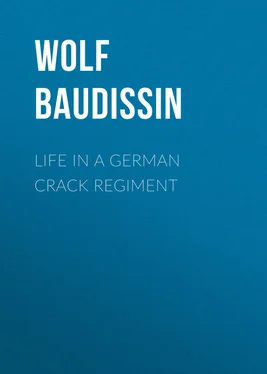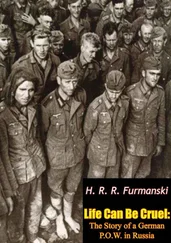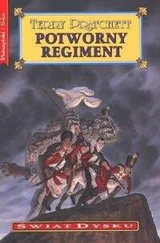Wolf Baudissin - Life in a German Crack Regiment
Здесь есть возможность читать онлайн «Wolf Baudissin - Life in a German Crack Regiment» — ознакомительный отрывок электронной книги совершенно бесплатно, а после прочтения отрывка купить полную версию. В некоторых случаях можно слушать аудио, скачать через торрент в формате fb2 и присутствует краткое содержание. Жанр: foreign_antique, foreign_prose, на английском языке. Описание произведения, (предисловие) а так же отзывы посетителей доступны на портале библиотеки ЛибКат.
- Название:Life in a German Crack Regiment
- Автор:
- Жанр:
- Год:неизвестен
- ISBN:нет данных
- Рейтинг книги:3 / 5. Голосов: 1
-
Избранное:Добавить в избранное
- Отзывы:
-
Ваша оценка:
- 60
- 1
- 2
- 3
- 4
- 5
Life in a German Crack Regiment: краткое содержание, описание и аннотация
Предлагаем к чтению аннотацию, описание, краткое содержание или предисловие (зависит от того, что написал сам автор книги «Life in a German Crack Regiment»). Если вы не нашли необходимую информацию о книге — напишите в комментариях, мы постараемся отыскать её.
Life in a German Crack Regiment — читать онлайн ознакомительный отрывок
Ниже представлен текст книги, разбитый по страницам. Система сохранения места последней прочитанной страницы, позволяет с удобством читать онлайн бесплатно книгу «Life in a German Crack Regiment», без необходимости каждый раз заново искать на чём Вы остановились. Поставьте закладку, и сможете в любой момент перейти на страницу, на которой закончили чтение.
Интервал:
Закладка:
They felt as if they had been throttled; such a sorrowful "hurrah" had never before been heard, and it was a fortunate thing that the loud-sounding fanfare echoed through the hall.
The "hurrahs" were over, His Highness had taken his seat again, but the rest remained standing, staring at each other as if they could not have heard aright, as if each wanted to learn from his neighbour's face whether what he had just heard could really be the fact.
"We have become a plebeian regiment."
Nobody knew who pronounced the word first, but at once the phrase passed from lip to lip – "We have become plebeian."
It was just as if a jug of cold water had been thrown into their faces, and indeed when at last they sat down to the table again and the music struck up a merry potpourri , they could not grasp, they could not take it in, this inevitable thing – that once more a "commoner" was in the regiment.
All their gay spirits had fled; indeed it appeared to the officers of the "Golden Butterflies" as if a quite new spirit had taken possession of the building. The festival had lost its splendour; it seemed as if the silver itself suddenly shone less brilliantly, as if the glass were less finely cut, and as if the hall no longer possessed the unique elegance that had hitherto distinguished it.
A painful silence reigned at the table, the "Golden Butterflies" did not venture to talk to their guests, for they knew they would be besieged by questions as to who and what this Winkler really was, where he came from, whatever could have caused His Majesty to transfer him from his frontier garrison town to this proud and distinguished regiment. It must have some signification. They did not venture even to look at their guests, for they knew that in the faces of the latter would stand clearly written: "You are no longer what you were; you cannot indeed help it that you have become plebeian, but the fact remains, and your position will be affected by this in the future."
If only the news that they were to receive a plebeian lieutenant had been communicated to them privately – but no, it had been announced publicly, in the presence of all the assembled guests, so that there was no possibility of denial or subterfuge. It was a direct slap in the face for them, and for the former officers, some of whom had come from a distance to be present at the dedication of the new buildings. And now into that new house a new element had been introduced. A commoner! Why had the regiment deserved it that the glory that had hitherto distinguished it should be removed? On the former occasion when a plebeian lieutenant had dwelt among them for a short time they had all suffered, and it was esteemed a special mark of the Emperor's favour that on the personally expressed wish of the officers he had been transferred to a line regiment. When they were again relieved of the stigma, each had sworn to live more zealously for the honour of the regiment so that a plebeian should not for a second time be received in their midst. Now this very thing had happened.
The Uhlan had regarded for a long time his neighbour who was looking gloomily in front of him; now he felt impelled to utter a sympathetic word, and everything that he felt in the depth of his heart he put into the remark, "What a pity! you were all so jolly in your regiment."
The officer of the "Golden Butterflies" shrugged his shoulders. What did these words mean but this: "The beginning has been made, other commoners will follow this one, and even if he does remain the only one, you will never be again what you once were."
The Uhlans were considered a frightfully exclusive regiment, and the "Golden Butterflies" had made the greatest efforts to maintain friendly and cordial relations with them. At last they had succeeded, and to-day the Uhlans almost to a man had appeared; the most aristocratic of regiments had been fêted with a costly dinner; and now, scarcely had the friendship been sealed when it was immediately threatened.
All breathed more freely when at last they rose from the table; the "Golden Butterflies" were most anxious to talk to each other, and learn something more of their new comrade. Somebody or other must know something about him; the fellow must have some sort of reputation – as much as was possible for a commoner, of course – otherwise His Majesty would not have interested himself on his behalf.
It was in this way that the men who had fallen into two groups – the guests, and the present and former officers – expressed their opinions; each had something to say as to his idea concerning the event.
The "Golden Butterflies" surrounded the adjutant of the regiment, Count Wettborn; he had become quite white, and was nervously fidgeting with the laces of his faultless patent-leather boots. After the colonel the matter concerned him most closely of all; he was often the representative and delegate of the officers, and now, was he to become a representative of a Winkler, he, a count? He was tall, of proud, imposing appearance; on his breast glittered as his latest decoration an order of the Fourth Class, which he had won as leader of the ball at court. For two years he had occupied this proud position; it was not only a great honour for him, but also for the whole regiment, and when he had stepped back into the rank he had been named adjutant, and all had heartily concurred in this promotion, deeming him the most worthy among them.
"But, count, do tell us, you must know something, who is this Winkler, then?"
Anxiously they all looked at the count; dead silence reigned, they scarcely dared to breathe.
"Gentlemen," at last said the adjutant, "whatever the colonel and I know we have just learnt from His Serene Highness. Old Winkler is a manufacturer."
They felt as if a stone had been rolled from their hearts. A manufacturer! It was not up to much, certainly, and not to be compared, of course, with the social position of a country gentleman or a chamberlain; but still, Krupp had been nothing more nor less than a manufacturer, and the German Emperor had called him his friend before the whole world. A load was taken from their hearts; but immediately they all saw that the count had still something on his mind, and that the question of being a manufacturer had some connection with it.
"And what does the fellow manufacture? Cannon or machines?"
"Neither – trouser buttons." If a flash of lightning had suddenly struck the officers they could not have started more quickly and with greater horror.
"Good heavens!" They looked around to see if any of the guests or the orderlies were close by, and then they crowded round the adjutant again.
Belitz, a very tall officer, was the first to recover himself; he was on very good terms with the adjutant, almost his friend indeed, and so he ventured to say, "Don't play any stupid jokes upon us, we are not in the mood for them, and such things should not be said in jest. Now do really tell us what the old fellow manufactures."
The count looked at the speaker calmly. "My dear fellow, I am not in the least in the mood for a joke, but I told you the fact. Old Winkler manufactures buttons, of course, wholesale. He has three large factories, and employs thousands of workmen, who are said to be splendidly looked after. For several years he has been on the Town Council, and for three he has been commercial adviser to the Emperor; quite lately he contributed a hundred thousand marks to a charitable institution which is under the special patronage of His Majesty, and he has also promised a contribution of twenty thousand marks for the next five years. He refused an important order that was offered him, and when he was asked in what way he could be thanked, he answered that it would be an intense pleasure to him if his only son might be transferred from a frontier garrison town to Berlin, so that he could see him more frequently. His wish could not be refused, and so his son has come to us."
Читать дальшеИнтервал:
Закладка:
Похожие книги на «Life in a German Crack Regiment»
Представляем Вашему вниманию похожие книги на «Life in a German Crack Regiment» списком для выбора. Мы отобрали схожую по названию и смыслу литературу в надежде предоставить читателям больше вариантов отыскать новые, интересные, ещё непрочитанные произведения.
Обсуждение, отзывы о книге «Life in a German Crack Regiment» и просто собственные мнения читателей. Оставьте ваши комментарии, напишите, что Вы думаете о произведении, его смысле или главных героях. Укажите что конкретно понравилось, а что нет, и почему Вы так считаете.












